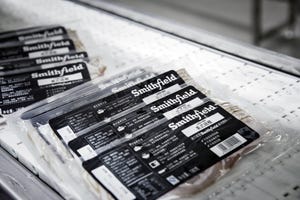
Howard Hill’s one-year term as president of the National Pork Producers Council may be over, but his involvement in issues important to the U.S. swine industry is far from over.
Hill, of Cambridge, Iowa, handed over the NPPC reins to Ron Prestage of Camden, S.C., at the recent National Pork Industry Forum held in San Antonio. As immediate past-president, Hill will chair the NPPC trade committee where he will continue to work toward resolution of the Trans-Pacific Partnership, among other trade issues.
“I wish I could have snapped my fingers and made it so (that TPP would have passed) during my term as president. … if I were king for a day,” Hill says, “but I do see it getting passed this year.” Hill says the Trade Promotion Authority legislation also known as “fast track” needs to be passed before TPP can be passed. TPA is the law that authorizes the president to negotiate trade agreements. Hill said in an earlier NPPC release “While NPPC is reserving judgment on a final TPP agreement, we believe it is imperative that Congress approve TPA as a signal to our trading partners that the U.S. is ready to finalize an agreement that expands U.S. trade and generates U.S. jobs.”
“We have worked on TPP for five years,” Hill says in a February telephone interview, “Hundreds and hundreds of people have been involved in working on this, and we have been able to get Japan to remove some tariffs on U.S. products.”
Global trade is imperative for the success of the U.S. swine industry, and Hill realizes getting a foot in the door may not be as important as keeping that foot in the door. “It’s one thing to develop the market, but it’s another thing is to keep that market,” Hill says. “There are times that phytosanitary issues that pop up, and then we have an issue in a large market and we have to respond to it.”
Hill sees himself as “one little spoke of a great big wheel,” and has come to appreciate the quality of the NPPC staff and producers he has worked with over the years since his first involvement with the NPPC. He has been impressed with his fellow pork producers, “when you ask a pork producer to step up, there isn’t much arm-twisting needed.”
Hill likes to borrow a line from NPPC CEO Neil Dierks when he says “we do have a strategic plan, but a lot of times it seems like we’re in crisis management, because we never know what the next issue is going to be that faces our producers. … then we also have the issues that just go on and on and on.”
Porcine epidemic diarrhea virus presented one of those issues that popped up that needed immediate attention. Hill, also a veterinarian, says PEDV really hit its stride this past year, “and that has taken a lot of attention and a lot of work, and I think producers have responded very well with farm biosecurity, and in their feed and feed supplies.”
Though PEDV cases are down from a year ago, Hill says about 20 to 25 new breaks are reported weekly, but these are not showing up on sow farms, but rather in finishers. “So we may have the virus coming back from that transport-packer interface, back to the finishing barns. Producers have done a great job of reacting to PED and controlling it.”
Hill stresses that biosecurity is a continual concept, “it’s not something that we can teach just once and then walk away.”
Though the onslaught of PEDV taught that the U.S. swine industry wasn’t prepared for such a disease, Hill lauds the industry for the quick response. PEDV has been a problem in Southeast Asia, particularly Korea, and by chance there was a virologist at Iowa State University from Korea who was “quite familiar with PEDV, so we were able to get after it in a hurry. … and we had a diagnostic test for it in a hurry.” Hill sees that as a testament to the strong diagnostic labs at such places as ISU, University of Minnesota, Kansas State University and South Dakota State University for being able to quickly respond
A unified effort between the NPB, National Pork Producers Council and the American Association of Swine Veterinarians resulted in the creation of the Swine Health Information Center to help the swine industry get better prepared for the next foreign disease. Hill will be vice president of the SHIC.
Hill also plans on continuing to take the pork producer message to Washington D.C. “I still plan on being involved in government relations this next year,” he says. “Going to D.C. to plead our case for pork producers; lobbying on behalf of producers.”
When Hill isn’t traveling for NPPC duties, he will continue to be active in his family’s farming operation that batch farrows 350 sows, has a 165-cow purebred Angus herd from which they sell bulls and bred heifers. The operation also has 3,000 acres of corn, soybeans and alfalfa. “So I’ve got plenty to do,” he says.
About the Author(s)
You May Also Like


